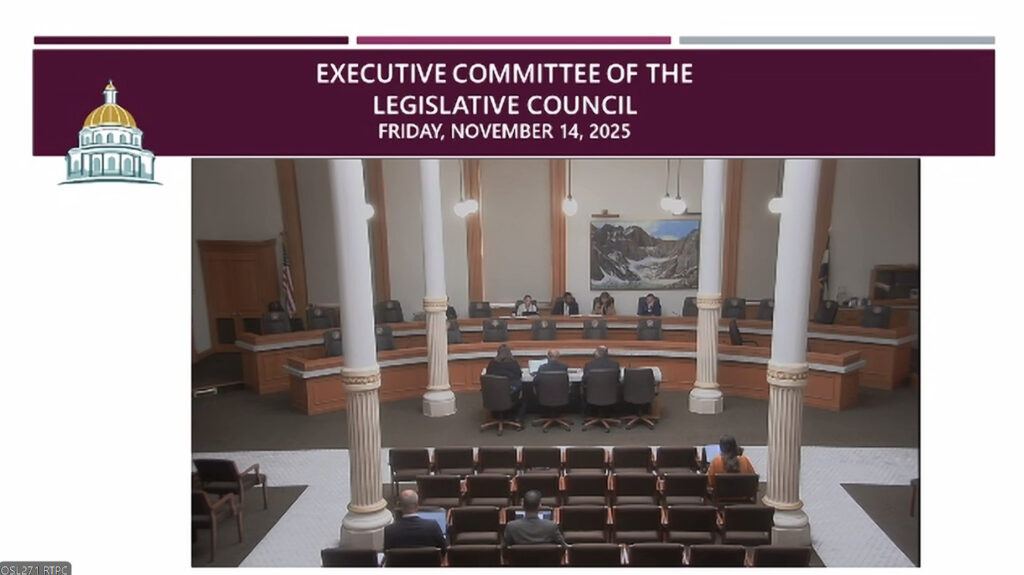By Jeffrey A. Roberts
CFOIC Executive Director
Leaders of the Colorado General Assembly still haven’t decided whether to provide video coverage of committee meetings during the 2026 legislative session that begins in January, but House Speaker Julie McCluskie expressed her support for the idea Friday.
“I look forward with optimism that we will expand the service we have started to provide and allow video streaming for all of our committee rooms,” the Dillon Democrat said during a meeting of the Executive Committee of Legislative Council.

More than 15,000 people so far have viewed 35 legislative committee meetings during a pilot video project that began July 30 and goes through the end of the year, Legislative Council Director Natalie Castle told the leadership. She mentioned receiving letters of support for continuing video livestreaming from the Colorado Freedom of Information Coalition and Bart Miller, chair of the Colorado Channel Authority Board.
Until the pilot, Colorado was the only state not to provide at least some video coverage of legislative committees, according to CFOIC research. The summer/fall test cost the legislature $3,500 and covered five committee rooms, using fixed committee room cameras and the same Sliq Media Technologies system that for several years has provided audio of legislative committee meetings.
Those tuning in online could see a wide shot of the committee as well as any slides referenced by speakers. Previously, you would see nothing but an illustration of the state Capitol building under the words “Audio Only.”
The feedback has been “very positive,” according to a Nov. 12 report on the pilot prepared by Legislative Council staff. “People were especially happy to be able to see slide presentations live,” it says. “… Notably, no one complained about the fixed view of the committee dais or that the video lacked a more professional production.”
McCluskie reiterated her support in a statement released after the Executive Committee meeting: “Video streaming increases transparency, improves civic engagement and helps modernize the legislative process. There is no doubt that video streaming is popular. While cost and budgetary constraints are certainly factors, I would like to find a way to continue streaming video of our committee hearings, and I want to thank our nonpartisan staff for their efforts to make this pilot possible.”
A decision on enabling video for all committee rooms during the 2026 session, which starts Jan. 14, could come in December. It would cost $50,000 for the session plus a one-time setup fee of $20,000.
Legislative leaders Friday also heard testimony on the Colorado Open Meetings Law, which is required by a 2024 bill that exempted state lawmakers from major provisions of that open-government law. Senate Bill 24-157 lets legislators communicate via email and text message without it being a meeting subject to the law. It also changed the definition of “public business” as it applies to the General Assembly to mean only introduced legislation, resolutions and other matters before a committee.
“Because Senate Bill 157 removed guardrails that were put in place more than 50 years ago to deter secret policy making, it’s now easier for legislators to meet behind closed doors or by email or text without public notice or scrutiny,” CFOIC executive director Jeff Roberts told the committee. He noted an October private gathering of lawmakers and lobbyists in Vail and a recent unpublicized meeting of the Joint Budget Committee and governor that was abruptly cancelled when a Colorado Politics reporter tried to attend.
Tim Regan-Porter, CEO of the Colorado Press Association, said SB 24-157 addressed concerns about “impractical requirements for legislators simply trying to communicate with each other. But we remain concerned that the pendulum has swung a little too far in the other direction. And this comes at a time when public trust in government and all institutions is at historic lows and continues to decline, making transparency more critical now than ever.”
Follow the Colorado Freedom of Information Coalition on X (formerly Twitter) @CoFOIC. Like CFOIC’s Facebook page. Do you appreciate the information and resources provided by CFOIC? Please consider making a tax-deductible donation.




